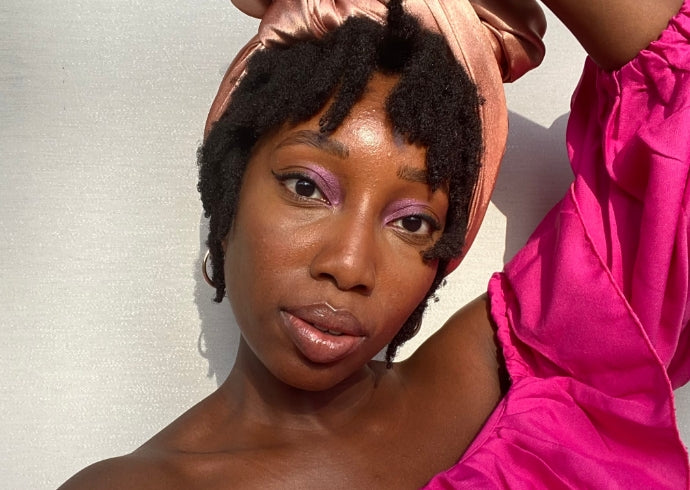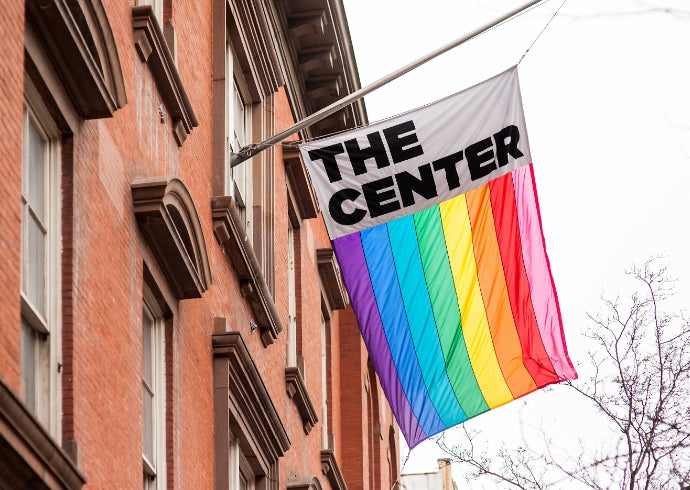At Milk, we stand for inclusivity and the freedom to live your life openly, authentically, and unapologetically. Laws that threaten our community affect all of us. A wave of recently passed and proposed anti-LGBTQIA+ legislation in the US is the latest attempt in an ongoing effort to strip the rights of LGBTQIA+ people. That's why this Pride, we believe it's more important than ever to uplift and create safe spaces for our community.
As language and culture evolves, part of fostering that safety means respecting other people’s pronouns. In this guide to pronouns, writer and poet Alisha Acquaye answers commonly-asked questions about pronouns and explores why using she/they pronouns is an act of self-love.
I started using she/they pronouns when I realized that “she” didn’t fit as seamlessly on myself as it used to. One day, I stretched out the fabric of “her” and found that I need to add more layers, inches, and patterns to it, to embody the fullness of who I am. “They” provides me more room as I continue to expand and unravel the different parts of myself. “They” is spiritual and infinite all at once. It is the acknowledgment of my multiplicity, the existence of many femmes and energies within myself, and the joyous exclamation of gender as fluid and ever-cycling, like water and time.
I still use “she” pronouns. “She” reminds me that my past is a constant part of myself, while “they” inspires me to continuously look forward to the future and to the limitlessness of who I am. “She” represents my kinship to all people who identify as femme, while “they” recognizes me moving into a self that is beyond the gender I’m perceived to be.
As a femme who has decided not to use my body in many of the ways that are expected of women, I’ve always been aware that how I experience womanhood, sisterhood, siblinghood, and my femme identity is not in alignment with heteronormative standards and patriarchy. Embracing the multitudes of my gender is an act of being a better friend to myself: revealing the parts of me I may have shut down.
What are pronouns and gender-neutral pronouns?
Pronouns are the words we often use when referring to others in place of their names. Pronouns can range from she/her and he/him, to gender-neutral pronouns including they/them, ze/zim, e/em, ve/ver, fae/faer and many more. Others may use we/us or it/its as pronouns, while some prefer to only use their specific names, or use multiple pronouns.
Every person who uses gender-neutral pronouns has a different relationship to them. For some, it’s a way of simultaneously honoring femme and masculine energy. For others, it’s about living outside of those binaries—beyond masculinity and femininity. Most use gender-neutral pronouns as another singular form, while others use it to express multiplicity. There are endless ways to relate to they/them and other gender-neutral pronouns. It’s also important to note that some people may use gender-neutral pronouns but still identify as a woman or man. They may find that gender-neutral pronouns better suit how they feel about themselves.
Why are pronouns important?
I like it when people alternate between “she” and “they” when they speak about me. It makes me feel vividly colored-in. It excites me.
As language evolves, we’re getting increased recognition of the pronouns we want used on ourselves. The evolution of language is one of the first signs that people who have been marginalized and othered are finally getting pushed to the forefront. Language plays a crucial role in maintaining social constructs and oppression, but when marginalized people take language into our own hands, that’s powerful. Pronouns provide a bridge to communication both among and beyond our community.
How can I be respectful of someone’s pronouns?
When thinking about how to respect people’s pronouns, I find it’s best to take an approach of grace and compassion. Accept that we will all, at some point, mistake someone’s pronouns (which is why it’s important to ask a person’s pronouns when we meet them, and to make it a habit of sharing our own in the process). How we deal with this mistake is much more telling. It’s important to decenter yourself in this process. The way in which you perceive someone’s gender expression doesn’t define how that person identifies themselves.
In other words, a masc-presenting person may not necessarily use he/him pronouns, and a femme presenting person doesn’t automatically subscribe to she/her. Not every androgynous person uses they/them pronouns. Society has taught us to see gender as binary, so it’s understandable when we mistakenly project these ideas onto others depending on their physical appearances. But, that doesn’t give us the authority to assume someone’s pronouns.
What should I do if I mispronoun someone?There isn’t one clear answer; every person reacts differently when this happens to them. Humble yourself and be open to their correction without getting defensive or overly apologetic. Because I use both “she” and “they” pronouns, I don’t have the same experience with mispronouning that a person who only uses they/them pronouns will have. I don’t share the experience of a femme person who exclusively uses she/her while people in her life continue to use the wrong pronouns, or someone who uses gender-neutral pronouns like ze/zim and encounters people who don’t have the patience to learn it. Apologize without taking too much space and thank the person for correcting you: “I’m sorry! Thanks for letting me know.” Moving forward, keep in mind that it isn’t the person’s job to keep reminding you of their pronouns. For some, it can be exhausting and make them feel unheard. Do the extra mental work of remembering their pronouns so they don’t have to repeat themselves continuously. How should I refer to someone who uses multiple pronouns?If your friend has multiple pronouns or new pronouns, respecting how they want to be addressed and seeking to understand them better is a fundamental step to being a better friend. It’s an act of love and allegiance, and helps you understand them in their expansiveness. |
 |
Learning to embrace the multitudes of pronouns that exist is as crucial as learning to correctly pronounce names we’ve never heard before. Stepping into pronouns that make us feel more fully visible and embodied is a way of naming our existence by our own terms. And when people respect our pronouns, we bend their tongues to speak into our presence with more clarity, fullness and authenticity—instead of shrinking into titles that they’re more comfortable with.
Which pronouns should I use when I can’t ask?
Sometimes, you might not get the chance to ask for someone’s pronouns. When that happens, you can default to using they/them, as the neutrality of these pronouns lends more space than he or she (which could be triggering for some). It’s also always a great idea to just refer to someone by their name, or ask a mutual friend how the person identifies.
It’s also important to be respectful of pronouns when talking to groups of people. Instead of using gendered language that assumes people’s pronouns like “you guys,” be more inclusive of everyone you’re addressing with gender-neutral language like “folks” or my fave, “y’all”.
What else should I know about pronouns?
There isn’t a set formula for how to use them or why people choose them. And pronouns don’t need to be permanent: A person can change pronouns multiple times, depending on how they feel and where they are in their becoming. Sometimes it’s as simple as someone addressing you by your pronouns and realizing it doesn’t sit well with you anymore, or hearing a new pronoun and finding that it feels just right.
At the core of queer and trans people reclaiming, rewriting, and redefining pronouns, there is a movement to change what it means for people to tell others who they are based on what they look like. Our appearances are not enough information to judge each other. But, many of the oppressive systems that have lasted this long have sustained themselves by judging people based on skin, background, hair, body, size, ability, and gender. That’s why by placing the words for ourselves in our mouths and giving people instructions on how to speak to us, we create a ripple effect that inspires mutual respect and a deeper examination on how to be more loving and compassionate to all people.
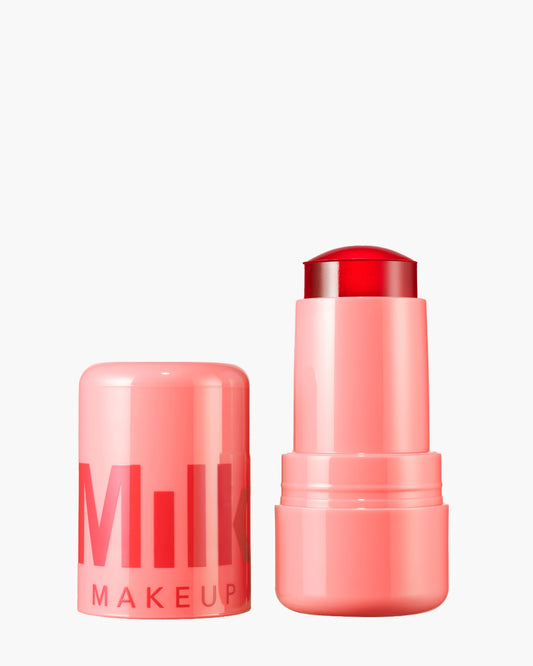
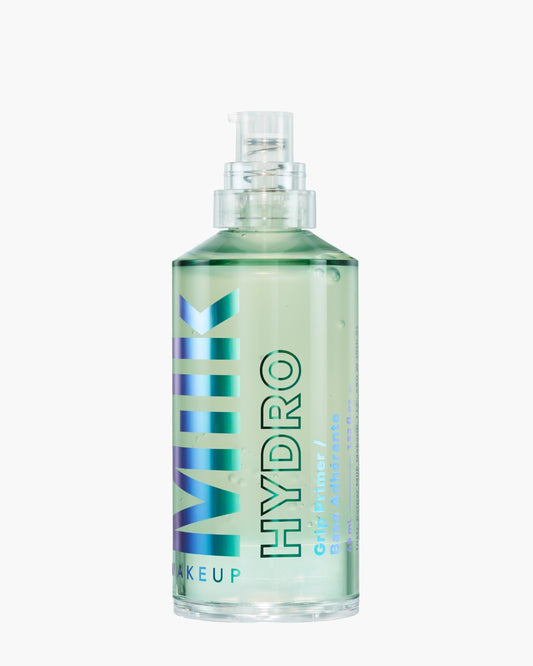

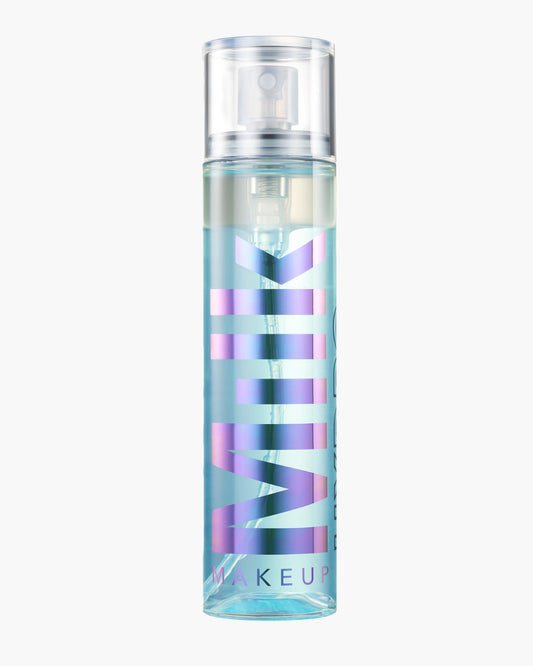
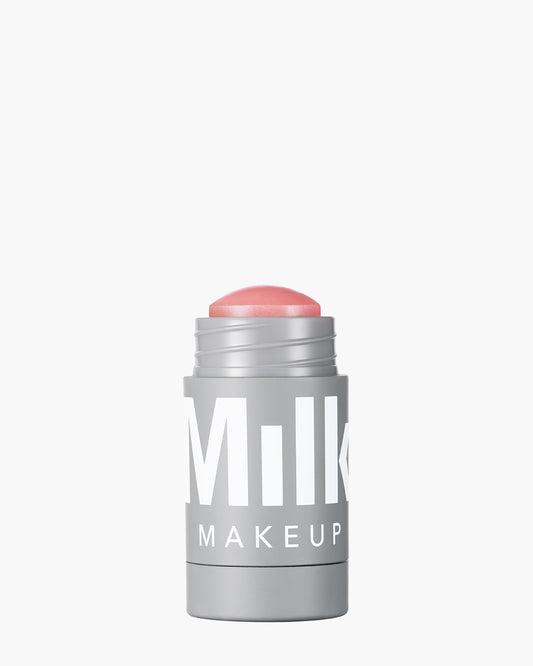
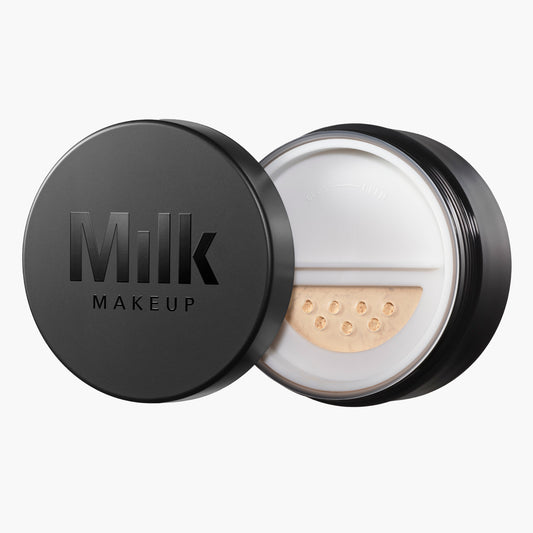

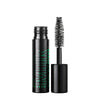



-%E2%80%A2-Instagram-photos-and-videos-v1709919701921.png?309x309) "
"